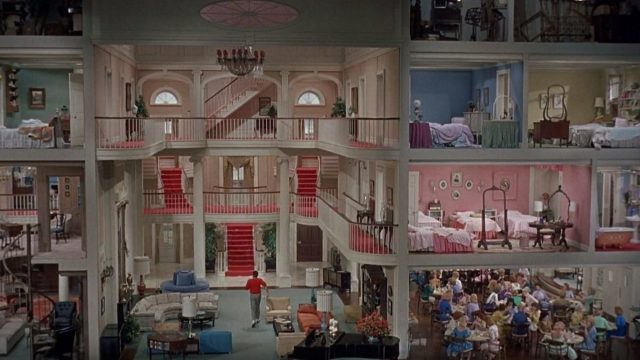Monday Movie: The Ladies Man, by Aaron Pinkston

Every Monday, we’ll highlight a piece of writing from our vaults. This article originally ran as part of Aaron Pinkston’s series following the Gene Siskel Film Center’s class on trangressive American Comedies.
My first exposure to Jerry Lewis (telethon aside) was just a few weeks ago, when I saw his most famous film (both as star and director), The Nutty Professor, as part of a classic cinema series at a local theater chain. Going in, I was well aware of the comedian’s reputation as the French-beloved wash-out now ridiculed or forgotten. Having some grasp of film history, however, I also knew of his great popularity in the 1960s as well as his influence on comic figures like Steve Martin, Jim Carrey and Adam Sandler, who endlessly entertained me growing up. All that in mind, The Nutty Professor isn’t exactly what I’d consider a “classic.” It is overly shaggy, sloppily edited and without a great sense of time. There is also, of course, Lewis’s dual performance as Professor Julius Kelp and Buddy Love, which ranges from strained to smug and is overall unlikeable. Two years earlier, Lewis released The Ladies Man, a successful film but not as culturally significant. The two films have a lot in common, from Lewis’s place in the center to the stances on gender dynamics, but The Ladies Man has more laughs and, more importantly, much more to say.
The plot of The Ladies Man is easy to explain, but it is all the non-narrative elements that makes the film so great. There is a fairly defined first act (roughly the first 15 minutes), where we meet Herbert H. Heebert (Lewis), a recent junior college graduate who has his heart broken by his best gal. Living with this torment, Herbert vows to give up women and becomes incredibly anxious whenever around any beautiful lady, in fear that she may repeat the crime. A socially broken man, Herbert looks for a “safe” job away from women and is ultimately led to the residence of Miss Wellenmellon, which at first seems in the clear. Hired as the houseboy, he then finds out that the house is for young women artists who are struggling to find work (or, perhaps, a brothel, if you read it in a particular way). Now among dozens of beautiful women, Herbert (and the film) devolves into madness, a glorious series of thinly-connected gags and vignettes in a “throw everything at the wall” approach.
The film’s nature is something like a mix-tape, where its scenes could be rearranged without much narrative or thematic effect. Incredibly, it sustains despite its structure — though not every scene is strictly comedic, and there are certainly scenes where the jokes don’t land, its entertainment never wanes. Lewis’s performance style is certainly derived from the classic silent comedians, but its absurdity feels more in step with more recent trends. Though Lewis is often marred as a relic of his time, The Ladies Man in particular is more reminiscent of Family Guy or the many works of Tim & Eric than many other comedies of the 1960s.
Especially from a mainstream, low-brow comedian, this is a confusing film. The Ladies Man isn’t exactly “smart,” but the film’s anarchic nature is more progressive than one would expect from a figure who is so derided today. Scenes like the extended dance in the all-white domain of Ms. Cartiledge border on surrealism, which is incredibly daring for a mainstream artist. The audacity also comes in with the film’s ridiculous set, a single-location, full-scale house that is shown off in long shots — I imagine Wes Anderson is fully aware of this work. Keeping the action in one space, albeit a massive and extraordinary one, helps to control its madcap nature.
Keeping the comparisons between The Ladies Man and The Nutty Professor, they approach similar problems, but the The Ladies Man is able to overcome a majority of them through its sheer will of force. Everything is a little bigger and louder in The Ladies Man, but it also has more purpose. The most comparable element of both films is the performances of Lewis — Herbert and Professor Kelp share some of the same ticks of nervous, nerdy manchildren, while Love is an obvious counterpoint. Herbert, however, doesn’t always feel weird for weird’s sake and actually comes off as a real person from time to time. This isn’t absolute, as Lewis has the bad habit of mugging to the camera and wildly overacting for effect, but Herbert is a little more aware of reality and actually says things that are purposefully funny instead of being a mere caricature. To me, Buddy Love is Jerry Lewis’s ego coming through in the worst way. Yes, he is meant to be an open criticism of Lewis frenemy Dean Martin and the Rat Pack culture, but I can’t help but feel like Lewis wants a part of us to think Love’s smug misogyny is actually pretty cool, too.
Speaking of misogyny, The Ladies Man isn’t exempt. The film’s basic premise is juicy with gender dynamics — a major theme in transgressive comedies. If The Ladies Man wasn’t so funny and weird, it could easily be mistaken as a horror film playing out men’s fears of what beautiful women might do to them. The absurdist comedy plays well as a fever dream, even as it is ridiculous that this buffoon would have anything to worry about (this problem is far worse in The Nutty Professor’s relationship between Kelp and Miss Purdy). At the film’s core is a cry for Lewis and his character to be needed, with his female tormentors using this need as an excuse to abuse him. They don’t mean to harm him, but continually exploit his helpfulness, all while being cute and innocent and suggestive. Only one of the young women stands out, a depressive and lonely woman who can identify with Herbert’s fragile state.
In the meta nature of the film, the women aren’t much more than dolls in a dollhouse for Lewis to play with. This is explicit in the setting, which looks like a real-scale dollhouse in the cross-section. Many of the film’s gags involve Herbert going from room to room and having various interactions with the ladies. The women are locked behind doors until Herbert comes around to give them a chance to show off a little. Their eccentric personalities are enhanced in a way that makes them feel more like girls than women, with their giggly vibes an open ploy to make the man in their lives feel good.
The Ladies Man is an incredibly complex and audacious comedy from one the cinema’s strangest figures. If you’ve written off Lewis or if The Ladies Man simply wasn’t on your radar, take this as a strong recommendation to seek it out. Besides being an entertaining, silly romp, its narrative and production are beyond fascinating. Like its main character, The Ladies Man does everything it can to make sure you love it, yet is still unapologetically weird, and there is something relentlessly charming about that.






























